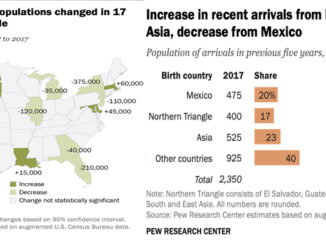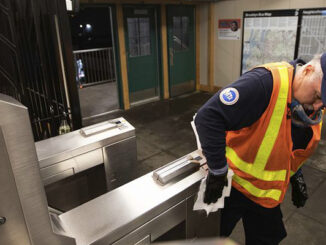
The administration’s crackdowns and rule changes benefit business.
by
The United States is a nation of immigrants, and a nation that exploits immigrants. It’s been a tangled partnership in which both sides benefit, if unevenly, given the power employers have over their most vulnerable workers.
Millions have gained citizenship and productive lives while the economy has thrived. Agriculture could not exist without an immigrant work force, while the list of immigrant-dependent industries has grown to include meatpacking, construction, hospitality and recreational sectors such as ski resorts — as well as golf courses owned by the president.
Meanwhile, as immigrants provide essential labor, helping businesses profit, the Trump administration has targeted those in some of the most onerous jobs in order to stir fear and hate, while exacting nothing from the employers.
The administration’s latest efforts to punish immigrants, for instance, is not just cruel, but foolish. Its new “public charge” rulewould deny legal immigrants permanent residency if they apply for food stamps, Medicaid or government-subsidized housing. Millions of legal immigrants will probably avoid seeking health care for their children and other services, so as to avoid scrutiny.
“Give me your tired and your poor who can stand on their own two feet and who will not become a public charge,” was how Ken Cuccinelli II, acting director of the Citizenship and Immigration Services agency, suggested rewriting the Emma Lazarus poem at the Statue of Liberty.
That’s perverse, since the Migration Policy Institute says most noncitizens who are in families that get benefits are working. And if they work full time, their median pay is about one-fifth less than what their native-born counterparts earned last year, according to the Bureau of Labor Statistics.
By cutting off immigrants’ path to a green card for the sin of being underpaid, this public charge rule makes them less desirable to some employers but vulnerable to exploitation by others that have only short-term gain in mind.
“This is not just that you are kicking people while they’re down,” said Shannon Gleeson, an associate professor at Cornell’s School of Industrial and Labor Relations. “It’s telling them, ‘We are not going to give you access to compete in the labor market.’”
As the administration makes life miserable for immigrant workers, life goes on for the employers of immigrants. Last week, Immigration and Customs Enforcement raided poultry processing plants in Mississippi owned by Koch Foods, in which 680 workers were detained on suspicion of being in the country illegally.
The owners have not been charged for employing undocumented immigrants, and the state helped them find new workers. Between April 2018 and this March, though, the government did not prosecute any companies for hiring undocumented workers, according to the Transactional Records Access Clearinghouse at Syracuse University.
The United Food and Commercial Workers International Union represented the employees at one of the plants owned by Koch, and the union reached a $3.75 million settlement with the company last year after an Equal Employment Opportunity Commission complaint that it had sexually and racially harassed Hispanic workers.
Last year ICE raided a unionized meatpacking plant in Salem, Ohio, a week after the Occupational Safety and Health Administration fined the owners for conditions that resulted in the death of an undocumented worker.
“These raids send a real signal to immigrant workers not to speak up, and we feel like these raids enable employers in the most dangerous industry to cut corners and violate labor standards,” Debbie Berkowitz, director of the worker health and safety program at the National Employment Law Project, told The Guardian.
It’s all consistent with a longtime pattern of employers exploiting immigrants to undermine pay and working standards. It happened more than a century ago in Pittsburgh’s steel mills, Kentucky’s coal mines and New York City’s garment sweatshops. More recently, it has taken place in the meatpacking industry, where immigrants were recruited to work with less pay and under worse conditions than in the unionized plants of 30 years ago.
The idea that any of this is about safeguarding jobs for Americans or keeping out loafers is absurd. The Labor Department reports that seven million jobs are going unfilled even as the economy is slowing. The labor force is growing more slowly as the population ages, and the birthrate is below the replacement rate. In an economy that is largely consumer driven, population growth is vital to growth.
Foreign-born workers include surgeons, computer engineers and financiers, and also those working in restaurant kitchens and driving cabs, doing the less desirable jobs at the lowest wages. But they contribute to the growth of the nation, and if some of them need help at some point with housing or food stamps, it’s a bargain in the long term. The economic return makes immigration a great investment for the nation. Which is why Mr. Trump’s public charge rule is bad for all Americans, not just those who strive to become one.
is a contributor to the New York Times editorial board.



